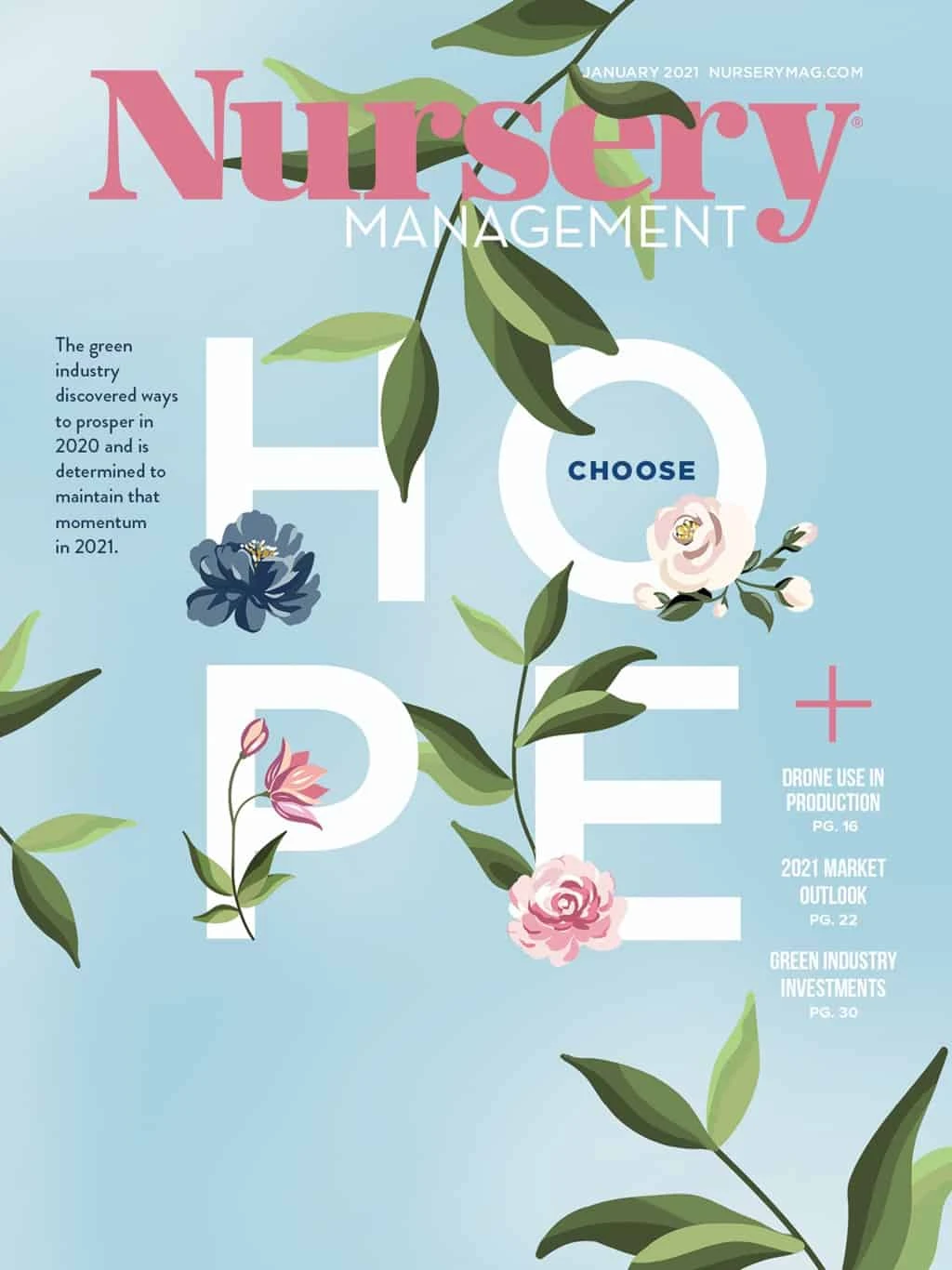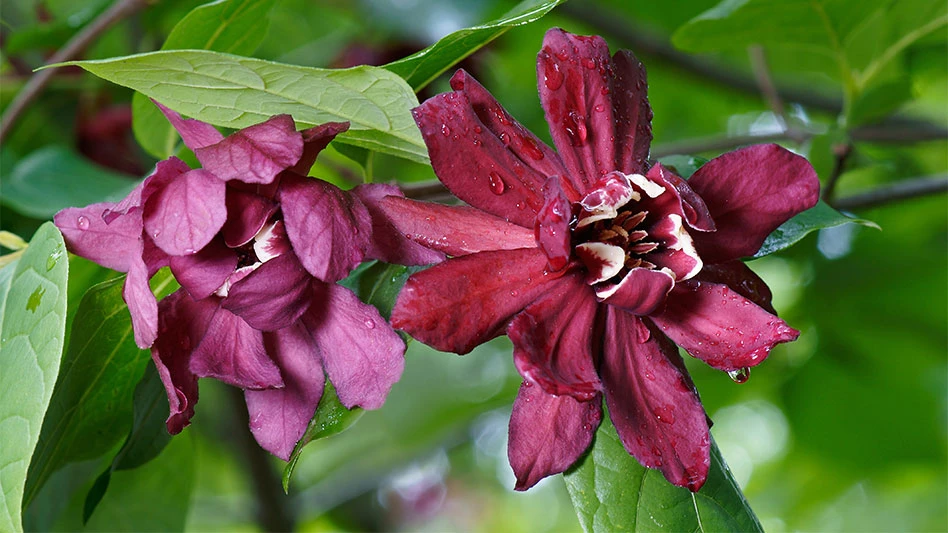

The green industry certainly is used to roller-coaster years. But 2020 was a year like no other. When growers should have been knee-deep in their busiest shipping time, no one was sure if there would even be a selling season.
As states began to identify growers, landscapers and retailers as essential businesses, the industry sprang back to life, albeit one with a whole new set of rules. In 2020, many green businesses enjoyed their best sales in years, despite the changing rules and regulations. How will these same businesses maintain the momentum gained during a pandemic? Will consumers stick with gardening with the same fervor once restrictions are lifted? How should the industry handle sales and marketing in the new year? Here are the perspectives from four members of the green industry.
Connie Rivera, founder of CityEscape Garden Center and Design Studio in Chicago
We are a full-service boutique garden center that I like to describe as a small firm that does big things. We’re known for many of the one-of-a-kind or unusual products we sell. We’re located on 3 acres just 10 minutes from downtown Chicago. When I started this business, I wanted to create an experience.
I expect a lot from our vendors, and I encourage all of our grower partners to visit us to see why we have those high expectations. We sell a 15-gallon variegated monstera for $1,500 and we can’t keep the large Pink Princess philodendron in stock that sell for $500.
We draw from Chicago’s North Shore neighborhood with expansive high-end landscapes, as well as people in the city with balconies and small terraces, and customers from the suburbs whose gardens are important to them.
No matter the customer, my mantra is creating an enjoyable experience. We value everyone who walks through that door, and building relationships is extremely important to my staff. We even have a customer that drives from Michigan to shop with us.

Creating an experience comes from my time as a CEO for a national nonprofit. I was always traveling with that job, and when I was on the road I’d run, often to a garden. I didn’t connect the dots that gardens are destinations for me until later when I decided to open a garden center.
We also have a landscaping business that serves many municipal and HOA contracts, as well as the Midway and O’Hare airports.
So when the shutdown came in March, I remember it very well. I was in Florida at the time and I wondered what were we going to do and how was I going to plan for something like this.
When I found out we couldn’t be open for shopping, I called a Home Depot not far from us. I asked to speak to the garden center and I asked if they’re open. When they said, ‘Of course. We’re open because we sell paint, lumber and other supplies.’ That really bothered me, and at that moment I chose not to stand down while Home Depot was open and I wasn’t.
I met with the mayor’s right-hand man about how upset I was and he asked me a lot of questions about my business. It wasn’t long afterward that we were deemed essential and were allowed to open. Our first priority was to make it safe for staff and customers. We reduced our operating hours, we reduced the amount of staff on the floor, I had masks made for all of my staff and we sanitized everything all day.
We offered curbside pickup, delivery and FaceTime shopping, which was a big hit. We still offer it now because we try to accommodate everyone to meet their needs.
We gained a ton of new customers. Part of it was because we were one of only a few garden centers that stayed open. Customers found us for the first time because there as was a climate where people wanted plants and good things. We were open and doing it in a way that made people feel safe.
It was our best retail year ever.
We saw more and more families with young children come into the store. And after talking to many of our new and existing customers, there’s going to be more family time and more time spent at home even after COVID-19. People found value in how they spend their time, and plants and gardening were a big part of that. I think there is going to be a ‘new normal’ in our world.
In 2021, I am concerned about the supply chain. We are taking as much product that is not perishable as early as possible. We are seeing some of our plant orders cut. Some growers had to dip into their 2021 inventory, so we may not have some of the larger sized product we’re used to selling. But I’m in constant contact with our growers, and all of our spring and summer plants have been prebooked for retail and our landscape business.
Lyndsi Oestmann, president of Loma Vista Nursery, Ottawa, Kansas
In late March, I felt like I was getting a little more information that would help us figure out what was going on and if we needed to make drastic changes. I was concerned with the health of the business and the safety of the employees.
We talked to vendors and they offered some flexibility. Our biggest question was whether we’d be able to ship our product at all. We were in the middle of our B&B shipping season and we did have some customers cancel orders. Some of those cancellations were significant and that fueled my concern. Those businesses were thinking the same thing I was: we’re going to do what we can to protect our business and make sure we have access to cash.
Our sales team started working right away on where to move that product. Some of it we held and some we moved in spring and summer.
Once we were deemed essential by the state of Kansas, we wondered where the rest of our product would go. But we didn’t have to wonder for long because things got crazy and our garden center customers were getting really busy.
What some of the garden centers did during the quarantine was tremendous, such as getting online orders set up and curbside pickups.
Our success as a grower is dependent on the success of garden centers, landscape contractors and rewholesalers. We feel really fortunate that people turned to gardening during the pandemic. We had to get really creative to service that sales surge, because we’re set up to do a certain amount of shipping per day or per week. Our dock was so busy, that we had to open up another area of our nursery to help with shipping. People who’d never been involved in shipping had to step up to help and learn that part of the business.
In 2020, it wasn’t just one small challenge that usually comes up in spring like normal years. It was several challenges at once, such as historic demand, employee safety and shipping constraints. There were so many things you had to think about and do differently to be able to maintain the operation. There were so many things to navigate, whether it was an actual rule the government put out or if it was making sure our employees are comfortable, or making sure our customers knew we were doing what was necessary and safe.
A lot of product that would have been sold in 2021 was moved in 2020, so that creates shortages on some product. Customer communication is always important to us, but because we weren’t able to go to trade shows and do customer visits, we relied on Zoom calls and asked more questions and ordered earlier than normal.
Our customers are planning for a big year again in 2021, so we made some strategic decisions to have more product available this year. We’re doing two phases of perennial production; we’re being flexible and we’re making more real-time decisions.
Consumers’ purchasing habits have changed and will likely stay that way for things like curbside pick-up, online orders, and delivery. That is now ingrained in their habits, just like with grocery shopping. I think we should be able to demand a good price for that product at retail but getting material to them in a timely matter is the most important detail right now.
For the industry to keep the consumers we gained in 2020, we need to look at two things. First, gardening will lose its appeal quickly if people aren’t successful, so we have to make sure we sell healthy plants to the garden center, so they have healthy plants to sell to the consumer. And we have to provide care and maintenance tips to make sure people are successful.
Second, we were deemed essential, so we need to make sure we stay essential in the eyes of the consumer. We do that by ensuring our employees and customers are safe and healthy and market the health and wellness benefits of our product appropriately.
Bob Bertog, president of Bertog Landscape Co. in Wheeling, Illinois
In March, the industry was in panic mode and no one knew what would happen. We were planning for the worst and we ran into the issue of fear from our workforce.
To help with safety, we sent two trucks to a jobsite instead of one, our crews kept everything wiped down during the day and we had a sanitation crew come in every night to disinfect everything.
Once people started sheltering at home, there was a huge spike in demand for design/build projects and we pounced on that. We ran specials on raised garden boxes and containers for customer who wanted to plant their own vegetables. We had to find creative ways to get people what they wanted. We did a lot of hardscapes and created outdoor rooms. Our sales staff concentrated on keeping in touch with all the new customers we gained and getting them on board with a maintenance project. Some people made a very large investment and they need to protect that investment.
I don’t see the demand going down until at least July because I don’t see people going back to offices until at least the summer. People still want to enjoy the outdoors for recreation and have a place to set up an outdoor office.
2021 will be a little challenging because of some product shortages, but our design team said they’ll get creative. We’re also facing a labor shortage in 2021, so that will have an impact on our business.
Sue Markgraf, owner of GreenMark Public Relations in Mundelein, Illinois
I’ve never been more proud of this industry. We stepped up to the plate to meet people where they are, and that speaks volumes about where we can go in the future and the potential we have in 2021. It was tough at the beginning because of the uncertainty we were facing, but we moved quickly with logic and reason and creativity. The challenges of 2020 made us think outside that proverbial box. We were able to grab on to tactics we may have tried eventually but had to grab on to now such as online transactions and virtual conferences.
We absolutely can maintain the momentum we created in 2020. We have a customer demographic that’s interested in being home and strengthening their life experience at home. They’re interested in strengthening relationships with family and with the environment at home. We’ve taken the indoors out and really capitalize on being outside.
In 2020, our customer has learned they love plants, and they don’t want the love affair to stop. So, we have to continue to innovate and be creative in our marketing message. The brand story in 2021 is not necessarily the logo story, it’s the people story. As long as customers and clients can relate to your people, even in a time of social distancing, we can still have those relationships.
When the pandemic started, we encouraged our IGC clients to do FaceTime shopping, which was a tremendous success. This is not a time for our industry to say, ‘no, we can’t do that.’ We have to try, we have to be creative and use the technology available to us.
We need to make sure education is at the top of our message in 2021.
Our products lift people’s moods, impact their spaces and help the environment, and enjoying the outdoor space was the silver lining of the pandemic. People are interested in their own comfort and nurturing right now, and our industry can provide product and spaces that bring comfort. Your marketing message in 2020 must be told with heart. Capitalize on our messages of hope.
Growers, your message should also target the consumer, not just your customers. Your story is one of the most important parts of the supply chain message. Telling your personality story offers a different perspective on life that people in times of struggle are hungry for, and not necessarily in times of a pandemic.
This year provides a beautiful opportunity for us. It’s an exciting time for our industry. We must market our products and services in a way that’s relatable to consumer with practical messages told with joy.

Explore the January 2021 Issue
Check out more from this issue and find your next story to read.
Latest from Nursery Management
- How impending tariffs and USDA layoffs impact the horticulture industry
- Shifting the urban environment
- These companies are utilizing plastic alternatives to reduce horticultural waste
- How to create a sustainable plant nursery
- Lamiastrum galeobdolon ‘Herman’s Pride’
- One of rarest plants on earth: Tahina spectabilis
- Leading Women of Horticulture: Angela Labrum, Bailey Nurseries
- Get to know Pat Reilly with NewGen Boxwood and the American Boxwood Society





